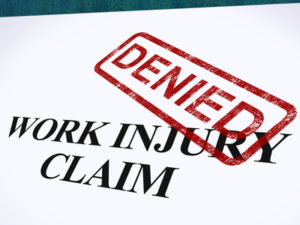The insurance company has a duty to pay you a workers compensation check when your injury prevents you from working. Georgia law provides that the insurance company must pay that check on a weekly basis.
I can tell you that many insurance companies fail to pay on time. Some miss weeks. Others do not mail the checks on time.
You depend on getting this check on time. Car payments and house payments do not stop when your workers compensation check is late. You still have to pay utilities. The workers compensation check replaces your paycheck, and you depend on receiving it on time.
 What penalties should the insurance company pay when they send my weekly workers compensation check late?
What penalties should the insurance company pay when they send my weekly workers compensation check late?
On late weekly workers compensation checks, the insurance company must pay a 15% penalty. If your weekly workers compensation check is $400, then the penalty for a late check is $60 (15% of $400).
Sometimes, the insurance company will include that penalty in the weekly check amount. Other times, they will send a separate check. Many times, the insurance company does not pay the late penalty unless someone requests it.
What should I do if the insurance company company does not send my workers compensation check on time?
Georgia law provides for penalties when the insurance company does not pay your workers compensation check on time. But, how do you know when to request those penalties.
You need to understand when a check is late under Georgia’s law. To make that determination, you need to understand two things about your check.
- Is the insurance company mailing your check from in Georgia or outside of Georgia?
- What weekly pay period does the check cover?
The best way to determine whether the check is being mailed from Georgia or outside of Georgia is to look at the envelope and the check. It should have the address of the insurance company. You can also look at the postmark if it has one to see if it is a Georgia postmark.
The check and check stub should probably have the pay period listed as well. The pay period means what week this check covers. For example, the check might say “Temporary total disability 12/11/16 to 12/17/16”. That indicates the check pays the period from 12/11/16 to 12/17/16.
What if the check comes from Georgia?
If the check comes from Georgia, the insurance company has to mail the check by the last day of the pay period. So, a check paying the period of 12/11/16 to 12/17/16 must be mailed by 12/17/16. If the insurance company mails the check after 12/17/16, the check is late.
What if the check comes from outside of Georgia?
The insurance company has to mail the check earlier from outside of Georgia. The law requires this earlier mailing to account for the time it may take the post office to deliver the check to you.
When a check comes from outside of Georgia, you still need to look at the last day of the pay period. However, you need to count back three days from that day because the law requires the insurance company to mail the check three days earlier.
Take the pay period of 12/11/16 to 12/17/16. If the insurance company mails your workers compensation checks from outside of Georgia, they would have to mail that check by 12/14/16 (three days before the end of the pay period).
How do I know when the insurance company mailed my workers compensation checks?
You can look for a couple of things to determine when the insurance company mailed your workers compensation checks.
- The postmark on the envelope – if the envelope has a postmark, that postmark should have a date. This date tells you when the check was mailed. Be sure and save the envelope in case the insurance company argues about the check being mailed late.
- The date on the check – the insurance company could not have mailed the check before it was issued. So, if the date on the check itself shows that it was after it should have been mailed, then the check is late.
 What if the post office delivers my check late?
What if the post office delivers my check late?
Under Georgia law, the insurance company only has to mail your checks by a certain date. The law does not hold the insurance company responsible for what happens after they mail your check.
If it takes the post office several days or more to deliver your check, the insurance company does not necessarily owe penalties. They only owe penalties on weekly workers compensation checks when they do not mail the checks on time. If a check gets lost in the mail, you may need to contact the insurance company to have them stop payment and reissue the check.
Can the insurance company have to pay other penalties for late checks?
In addition to penalties on weekly checks, Georgia law also establishes penalties for late medical bill and mileage reimbursements and late payment of awards. I discuss the mileage penalties in more detail in my mileage article.
The insurance company must pay a 20% penalty when they pay an award late. This penalty becomes especially important when you go to court and get an award or settle your case because it can apply to the entire award or settlement.
When is payment of an award or settlement late?
The law gives the insurance company 20 days to pay an award. If the insurance company does not pay the award or settlement within 20 days, then they owe the 20% penalty. Since awards and settlements are often for larger sums of money, this twenty percent penalty can be substantial.
What if the insurance company refuses to pay the late penalties they owe?
The law provides additional remedies when the insurance company refuses to pay the late penalties they owe on weekly workers compensation checks or an award. A judge may order the insurance company to pay assesed attorney’s fees. The judge can also order the insurance company to pay reasonable litigation expenses.
The law allows judges to assess attorney’s fees when the insurance company fails to follow the rules on payment of benefits. O.C.G.A. 34-9-221 is the part of the law that covers most of those rules. When you hire an attorney to enforce your right to late penalties, a judge could force the insurance company to pay the attorneys fees associated with getting those penalties paid.
A judge could also force the insurance company to pay some of the costs associated with taking the insurance company to court. These costs could include witness fees, depositions, and the hearing transcript cost among other things.
 What penalties should the insurance company pay when they send my weekly workers compensation check late?
What penalties should the insurance company pay when they send my weekly workers compensation check late?
 What if the post office delivers my check late?
What if the post office delivers my check late?







